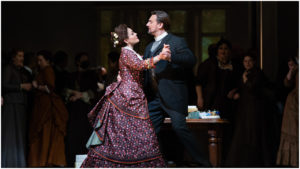
Metropolitan Opera 2021-22 Review: Eugene Onegin
Ailyn Pérez, Igor Golovatenko, Piotr Beczala Shine in Stunning Revival
By Logan MartellOn March 25, 2022, the Metropolitan Opera presented this season’s premiere of Tchaikovsky’s “Eugene Onegin.” Deborah Warner’s 2013 production holds strong nearly a decade later through its emphasis on the humanity of the moment and the music. Led by Maestro James Gaffigan, Friday’s cast was comprised of artists new and familiar to the work, who never failed to seize the instant and thrill the audience.
The performance was dedicated to the memory of Joel Revzen; an assistant conductor since 1999, he made his conducting debut with the company in 2017 with “Eugene Onegin,” before tragically passing away two years ago due to COVID.
Stunning Debutante
Making her role debut as Tatiana was Ailyn Perez. Her initial shyness was expressed through a meaning in gesture which often melded with the orchestra for maximum effect. Following the chorus, her interactions with Olga and Larina provided charming glimpses into her character, fleshed out further during the brief quartet between her, Olga, Lenski, and Onegin. Naturally, it is the Letter Scene where all of Tatiana’s inner fantasies and emotion are put on full display; Perez’s rendition carried with utterly endearing infatuation, which ebbed and flowed in great waves of passion and sonorous vocality. Instrumental sections saw her led about by these feelings, throwing open the doors to the garden and seeming to relive her meeting with Onegin as the orchestra powerfully announced the romantic motif. This 12-minute dramatic gauntlet was met with tremendous applause, marking this new moment of triumph in Perez’s career.
As the eponymous Onegin, Igor Golovatenko was superb. His initial interactions with Tatiana saw him use a refined bearing that was contrasted by his cool yet expressive tones, deftly creating the Byronic sense of one who does not lack for passion, but is merely bored by it. This Onegin appeared to be quite sympathetic to Tatiana, and his Act one aria “Kogda bi zhizn domashnim krugom,” reflected this through warm phrasing and a crisp delivery, while still retaining the air of pretense that makes this moment sting for her, even when leaving her with a parting kiss. These refined qualities made it all the more impactful during his final scenes in Act three, where his shell of ennui was powerfully torn open by his newfound feelings of desperate love, drawing a wealth of fevered, compelling tones from Golovatenko.
In the role of Lenski, Piotr Beczala expertly conveyed the poet’s romantic nature physically and vocally. His early, playful interactions with Olga soon melted with beautiful sentiment into his aria “ja lyublyu vas,” where he quickly displayed ardent high notes which, despite Olga’s demurring, found their mark with her as well as the audience. These qualities were explored in greater detail through the scenes of the second act, as Olga’s rebuffs during the dance brought forth suitably-wounded tones which built into the heated argument between him and Onegin. His rendition of “Kuda, kuda vï udalilis” saw these conflicting feelings of love and anguish blend into a breathtaking amalgam of dramatic expression as Piotr’s Lenski mused on the world and the life that could have been. Exulting in the sense of fatalistic beauty, this aria was brought to an appropriately-tragic conclusion, garnering near show-stopping applause.
As Olga, Varduhi Abrahamyan’s time onstage often held great jubilance which rang clear through her rich mezzo-soprano. This energy served nicely in taking the audience from the rich chorus and dance to her aria “ja nye sposobna k grusti tomnoy,” as her delivery flowed between peppy and lyrical, matching well with the orchestral texture. Her darker vocal color not only complimented Beczala’s when following his impassioned Act one aria, but added much to the spurning which drives a wedge between Lenski and Onegin in Act two.
Although his role was a brief one, Ain Anger captivated as Prince Gremin. His Act three aria “lyubvi vse vozrasti pokorni” was a remarkably tender showcase in praise of love and the vision of splendor Tatiana has become. He employed a dismissive rubato in listing the tiresome scenes of life which gave his taken, sustained peaks all the more sense of being rejuvenated by love.
Sumptuous Yet Stark
While Friday’s cast of artists excelled through their respective numbers, the orchestra’s talents were on full display as they illuminated Tchaikovsky’s score through the dance and choral numbers. Maestro Gaffigan kept the pacing vivacious without glossing over all the beauty in moments such as Act two’s waltz and mazurka, and Act three’s polonaise; instead, these numbers made for highly expressive interludes where the spectacle reinforced the passions of the cast with luxuriant color. Moments of solemnity or despair, such as the duel of Act two, or Tatiana’s rejection of Onegin, were treated with such poignant gravity and attention that ensured the lows of life were explored as much as the highs.
Despite the opulence of its score and setting, Tom Pye’s set takes a humbler approach to the drama which gets its point across while keeping the focus on the characters. While locales such as Madam Larina’s estate and the Prince’s palace tended towards the bare side, it allowed the stage to be filled with the full presence of the chorus and dancers. This starkness reached a haunting peak for the second half of Act two, for Lenski’s aria and duel, which featured little more than snow, fog, and distant trees.
For the final scene, the columns which remained from the palace interior served to frame the cold wastes as a sort of prison as Onegin madly pleaded his love for Tatiana, with both now kept apart by their respective duties and choices in life.
Friday’s performance had no shortage of stunning moments, from its expert artists and orchestra to the excitement of the ensemble and dance numbers, it had essentially everything one goes to see in a musical drama. Each lyric scene was embodied with such care and continuity that the story flowed seamlessly from a visual and aural standpoint.
Lovers of Tchaikovsky and opera as a whole will not want to miss the remaining performances of this season’s run.



